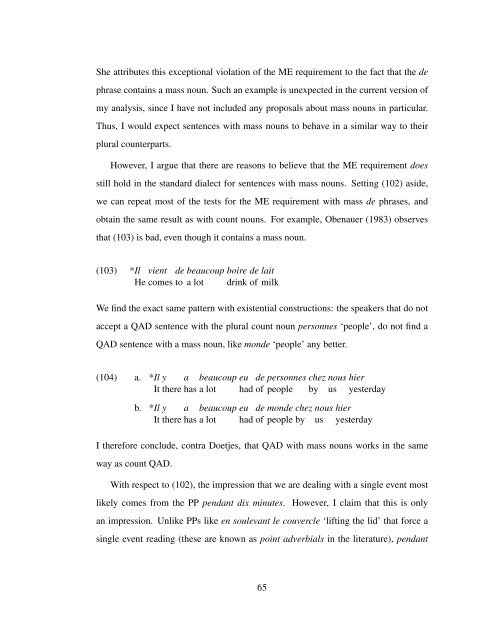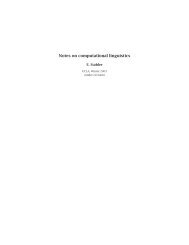Formal Approaches to Semantic Microvariation: Adverbial ...
Formal Approaches to Semantic Microvariation: Adverbial ...
Formal Approaches to Semantic Microvariation: Adverbial ...
Create successful ePaper yourself
Turn your PDF publications into a flip-book with our unique Google optimized e-Paper software.
She attributes this exceptional violation of the ME requirement <strong>to</strong> the fact that the de<br />
phrase contains a mass noun. Such an example is unexpected in the current version of<br />
my analysis, since I have not included any proposals about mass nouns in particular.<br />
Thus, I would expect sentences with mass nouns <strong>to</strong> behave in a similar way <strong>to</strong> their<br />
plural counterparts.<br />
However, I argue that there are reasons <strong>to</strong> believe that the ME requirement does<br />
still hold in the standard dialect for sentences with mass nouns. Setting (102) aside,<br />
we can repeat most of the tests for the ME requirement with mass de phrases, and<br />
obtain the same result as with count nouns. For example, Obenauer (1983) observes<br />
that (103) is bad, even though it contains a mass noun.<br />
(103) *Il vient de beaucoup boire de lait<br />
He comes <strong>to</strong> a lot drink of milk<br />
We find the exact same pattern with existential constructions: the speakers that do not<br />
accept a QAD sentence with the plural count noun personnes ‘people’, do not find a<br />
QAD sentence with a mass noun, like monde ‘people’ any better.<br />
(104) a. *Il y a beaucoup eu de personnes chez nous hier<br />
It there has a lot had of people by us yesterday<br />
b. *Il y a beaucoup eu de monde chez nous hier<br />
It there has a lot had of people by us yesterday<br />
I therefore conclude, contra Doetjes, that QAD with mass nouns works in the same<br />
way as count QAD.<br />
With respect <strong>to</strong> (102), the impression that we are dealing with a single event most<br />
likely comes from the PP pendant dix minutes. However, I claim that this is only<br />
an impression. Unlike PPs like en soulevant le couvercle ‘lifting the lid’ that force a<br />
single event reading (these are known as point adverbials in the literature), pendant<br />
65
















